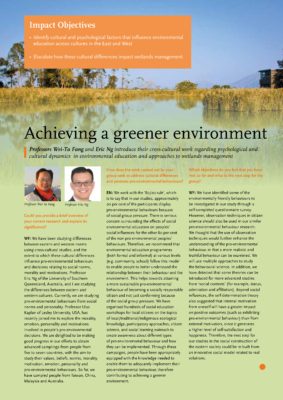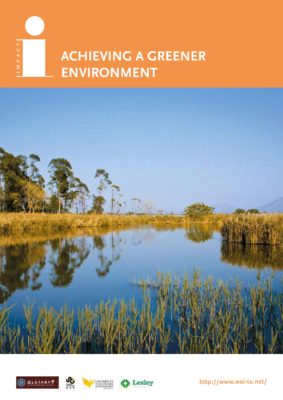文章標題:Development and Investigation of Social Norm Applied to Environmental Literacy Scale
文章連結(DOI):https://doi.org/10.21820/23987073.2018.6.23
 The conservation and restoration of wetland ecosystems is vital, and it is crucial that people are educated about this pressing issue. A research group, led by Professor Wei-Ta Fang of the National Taiwan Normal University (NTNU), has identified that insufficient attention has been paid to the environmental and social consequences of the loss of biodiversity. In response, Fang and his collaborators are working to change the status quo. Fang is currently leading a project called Wetlands Management Research, working with collaborator Professor Eric Ng of the University of Southern Queensland, Australia. Through the project, the team is comparing cultural differences between eastern and western approaches to environmental education, and exploring how these differences impact wetlands management. Fang’s current work is funded by grants from the Ministry of Science and Technology, Republic of China (Taiwan) and also subsidised by the NTNU. ‘This funding may help us to lead a pioneering study on natural science and social science on environmental education, outreach and communication,’ he enthuses. To date, Fang’s team have completed a large number of research projects, including: ‘Modeling driving forces of avian diversity in a spatial configuration surrounded by farm ponds’, ‘Low Carbon Footprint Routes for Bird Watching’, ‘Normative Beliefs, Attitudes, and Social Norms: People Reduce Waste as an Index of Social Relationships When Spending Leisure Time’, ‘Physical Outdoor Activity versus Indoor Activity: Their Influence on Environmental Behaviors’ and ‘Atayal’s identification of sustainability: traditional ecological knowledge and indigenous science of a hunting culture’. While diverse in nature, all of these projects are united by their shared goals of achieving sustainability. In the current project, Fang is working with Ng to study pro-environmental behaviours from social norms and personality, and also collaborating with Kaplan to explore the morality, emotion, personality and motivations from their pro-environmental decisions. The researchers have encountered challenges in the form of the environmental psychology surrounding self-report questionnaires enforced in many countries, as some theories from western psychology might not necessarily apply to eastern societies, and vice versa. However, Fang believes he has found an innovative solution to this: ‘By figuring out the human ecological differences between eastern and western cultures, I may be able to detect the mental differences to find the delicate issues ignored from current researches,’ he expands. ‘Therefore, my research may be quite pioneering and go beyond that of traditional researchers.’ Looking ahead, Taiwan EPA and localities are donating more than US $25 million to environmental education funds aimed at promoting environmental education and outreach for more outdoor events in 2018, which should ultimately assist in the drive to achieve sustainability ]
The conservation and restoration of wetland ecosystems is vital, and it is crucial that people are educated about this pressing issue. A research group, led by Professor Wei-Ta Fang of the National Taiwan Normal University (NTNU), has identified that insufficient attention has been paid to the environmental and social consequences of the loss of biodiversity. In response, Fang and his collaborators are working to change the status quo. Fang is currently leading a project called Wetlands Management Research, working with collaborator Professor Eric Ng of the University of Southern Queensland, Australia. Through the project, the team is comparing cultural differences between eastern and western approaches to environmental education, and exploring how these differences impact wetlands management. Fang’s current work is funded by grants from the Ministry of Science and Technology, Republic of China (Taiwan) and also subsidised by the NTNU. ‘This funding may help us to lead a pioneering study on natural science and social science on environmental education, outreach and communication,’ he enthuses. To date, Fang’s team have completed a large number of research projects, including: ‘Modeling driving forces of avian diversity in a spatial configuration surrounded by farm ponds’, ‘Low Carbon Footprint Routes for Bird Watching’, ‘Normative Beliefs, Attitudes, and Social Norms: People Reduce Waste as an Index of Social Relationships When Spending Leisure Time’, ‘Physical Outdoor Activity versus Indoor Activity: Their Influence on Environmental Behaviors’ and ‘Atayal’s identification of sustainability: traditional ecological knowledge and indigenous science of a hunting culture’. While diverse in nature, all of these projects are united by their shared goals of achieving sustainability. In the current project, Fang is working with Ng to study pro-environmental behaviours from social norms and personality, and also collaborating with Kaplan to explore the morality, emotion, personality and motivations from their pro-environmental decisions. The researchers have encountered challenges in the form of the environmental psychology surrounding self-report questionnaires enforced in many countries, as some theories from western psychology might not necessarily apply to eastern societies, and vice versa. However, Fang believes he has found an innovative solution to this: ‘By figuring out the human ecological differences between eastern and western cultures, I may be able to detect the mental differences to find the delicate issues ignored from current researches,’ he expands. ‘Therefore, my research may be quite pioneering and go beyond that of traditional researchers.’ Looking ahead, Taiwan EPA and localities are donating more than US $25 million to environmental education funds aimed at promoting environmental education and outreach for more outdoor events in 2018, which should ultimately assist in the drive to achieve sustainability ]
